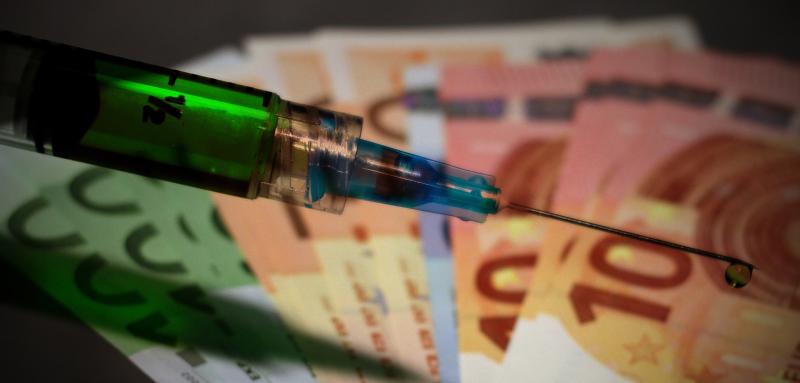
'Lobby-docs' show big pharma's misleading arguments on vaccines asking the EC to reject global technology sharing
The biggest pharmaceutical companies have proved to be staunch opponents of sharing technology on COVID vaccines and medicines. In particular, they are fiercely opposed to a proposal to temporarily suspend intellectual property rights on vaccines and medicines for the duration of the pandemic, as proposed by India and South Africa at the World Trade Organization. And after lobby meetings the European Commission basically agreed to the wishes of the pharmaceutical industry.
Corporate Europe Observatory (CEO) today discloses new documents showing big pharma EFPIA-lobbyists' arguments to defend monopoly intellectual property rights on vaccines. They reveal industry claims in the early stages of the vaccine roll-out that manufacturing and distribution were under control – and that there was then no need to share technology to increase capacity – a rosy image that contrasts starkly with today's reality.
The key meeting with DG TRADE, the branch of the Commission responsible for trade negotiations, took place on 9 December 2020 at which EFPIA explained that the current global strategy was pointing in the 'right direction'. Since early this year we know it is not the case, particularly for low-income countries, but in Europe too.
CEO describes in a new publication, part of a series of investigations (3) based on documents obtained through Freedom of Information requests, how big pharma's self-serving claims have in effect worked to block global access to vaccines, and how at the highest levels EU policy-makers and politicians have followed their lead. This despite (repeated) claims to the contrary, such as with EC-president Ursula von der Leyen's April 2020 statement that: "the vaccines should be a universal common good".
Kenneth Haar, researcher at Corporate Europe Observatory (CEO) said:
"The pharmaceutical industry told the European Commission in December: Everything is in good hands, we will make sure vaccines reach everyone across the globe, there is no need for extraordinary measures. Trust us. Today it should be clear to everybody that is not the case. We need expansion of vaccine manufacturing through technology sharing, and we need it now. We cannot let a few companies stand in the way of global public health."
"What we see clearly from our recent investigations, is that big pharma is calling the shots and determining the global approach to this pandemic. So 4 or 5 multinationals basically control when and how we will get out of this pandemic and at which cost, both in terms of tax payers money as of how many lives."
ENDS
Notes to editors:
- 1. Big Pharma massively outnumbers and outspends other interests (such as public health NGOs) in EU lobbying. The 10 biggest pharma companies spent more than 15 million euro in 2019 on lobbying the EU. EFPIA recently updated its lobby spending figures in the Transparency Register: it reports increasing its lobby spending to up to €55 million in 2020, involving 25 lobbyists in these efforts (up from €4.6 million in 2019, an increase of around 20%).
- 2. Lobby documents released as a result of our FOI request throw new light on EFPIA's lobbying. While it was no surprise to find EFPIA fighting any easing of intellectual property rights (this has been their priority through the pandemic as shown our report "Power and profit during the pandemic"), the arguments turned out to be so bold they appear ridiculous and manipulative today.
- 3. The 'Pharma Files' so far has these recent episodes:
EU risks public health in its protection of big pharma monopolies | Corporate Europe Observatory
Patently absurd | Corporate Europe Observatory
- 4. There is a close alignment between the Commission and the big pharma lobby groups, both arguments and rhetoric are similar. This become increasingly problematic for the EU as a clash over intellectual property rights is intensifying, and is unlikely to go away. In October, the Indian and South African governments tabled a proposal at the World Trade Organization (WTO) to waiver intellectual property rights on vaccines and medicines. In the face of dire scarcity of vaccines, such a proposal has a lot going for it. But the EU negotiators from the Commission keep rejecting the idea.
